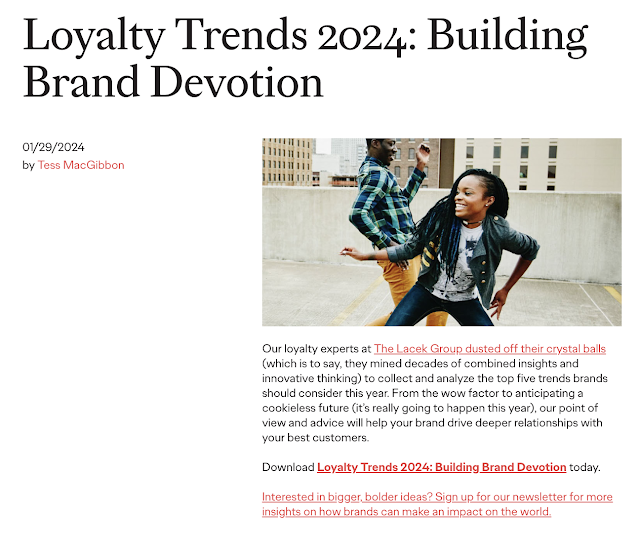I get about 100 LinkedIn requests a week.
And have for about ten years now.
These days, most people who want to connect are strangers to me.
You knock out the putative sex-workers and I still get 60 requests a week.
Of those 30 are friends of friends, or they've been recently fired. The remaining 30 are people who are trying to sell an agenda. They're usually trying to sell it hard.
Six months ago, they were all trying to sell me on the splendors of the Metaverse, or Web 3.0, or something. They have the zeal of true believers. They're converts. And like most converts, to rationalize, justify, and affirm the correctness of their belief, they have to get someone else to believe.
You see the same thing with TV shows, fashion trends, diets and political panacea.
I'm 66 years old and somehow I've overlooked the growing importance of colored caps and embossing technology.
This, this, this is the thing that's going to change everything.
And only I have it figured out. It's like applying "My Pillow" thinking to everything. It's "I have the secret. You must listen to me. Only I know the one true path." Culminating in the biggest of all lies--and the most repeated and the most evil--that everything else is dead.
That's the one that really rubs my goat the wrong way. As Faulkner said, "The past isn't dead. It is not even past." Nothing is ever dead. In fact, it seems like half our country believes the earth is flat, that the bible (the parts they like) is the literal truth and that following a paleo diet is good for you even though, the cavemen, the purported first-followers of the diet, died at about 25. So, about 400 years after the Enlightenment, we're still believing the the Medieval.
I was talking to a friend Friday night. We started like a lot of New Yorkers do with the glowing and resurgent Knicks, New York's basketball team nicknamed after the pants the early Dutch settlers to New York wore.
I said, "John, I haven't watched a second of the Knicks this year. I see how they're doing on The Athletic (a New York Times' sports site) but frankly, I no longer understand the language of the game. I don't know what anything means anymore. If I just read a description I'd have no clue what was going on. I have no idea what a wing is or a 3 and D or about 19 other terms that are an attempt to complicate a game that's essentially about putting a pig-bladder through a peach-basket."
It's the same game I played until I was 30. At that point I got beat up too much by knees and elbows that were the bread and jam of the local schoolyard game I played. I'd come home so bruised and beaten that it was jeopardizing in equal parts my life-expectancy and my marriage. It's the same game I played with an entirely new argot.
In everything from advertising to politics to sports to whatever, we have made ourselves feel special and expert by creating a language of complication to fuzzy-ize it so we can feel our expertise is unique, valuable, maybe even commercializable.
Remember, it wasn't that long ago that advertising people were "influencers." Our work influenced people.
Years ago I played on a baseball squad managed by the Miller Huggins, John McGraw and Casey Stengel-combined of the Mexican League: Hector Quetzacoatl Padilla, aka Hector Quesadilla.
When the thin infield dust and the particles of carbon per million wafting through the atmosphere had all settled, Hector had one basic strategy.
"Hit a double."
There's no amount of data, no algorithm known to human or machine, no programmatic legerdemain that can knock a man on first in to score like a double can. There's no patented proprietary formula yet discovered that can wear down a pitcher and rattle his confidence like a seeing-eye-ground ball that advances a runner into scoring position. There's nothing like putting the ball into play that does more to keep your team itself in play.
 |
| Writing with more than one pound of BS per square-word. |
When all the hyperventilation about the science of advertising and the bright yellow highlights in business books (which are usually written by people who haven't made an actual living in business) have crumpled up and blown away, there's a truism you might have to reckon with, if the industry and countless more like it, ever returns to the reality-based community.
As baseball is about hitting the ball harder and more often than the other team, and basketball is about making more shots, and politics is about getting more votes, advertising is about making ads--more ads and better ads and putting them in front of people with money. So they buy more than they'd otherwise buy
There's no advertising paxil, prozac, lexapro, effexor or anything else that can un-depress you from that fact. You can circumlocute like a thousand Oxford-trained planners reading from a billion gorgeous keynotes with perfect dissolves, but nothing can shake that truth. Just like bible thumpers and televangelists can read all they want of the good book, it's meaningless without you're being actually good to people.
No matter how you dress them up, it's the simple, timeless human truths that matter.
When it comes to advertising, I learned a lot from Hector, the old one, and most of it was as simple as a heater over the center of the plate.
Figure out what you do. Figure out how it's different. And tell people in a unique and memorable way.
Hopefully, it's not this: using bad stock of six-percent bodyfat people dancing on rooftops to drive loyalty.
Like, d-oh.




No comments:
Post a Comment